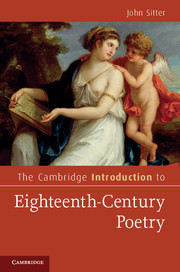Book contents
- Frontmatter
- Contents
- Acknowledgments
- Note on texts and titles
- Introduction
- Part I Voice
- Chapter 1 Voice in eighteenth-century poetry
- Chapter 2 The heroic couplet continuum
- Chapter 3 Vocal engagement: reading Pope’s An Essay on Criticism
- Chapter 4 Talking in tetrameter
- Chapter 5 Blank verse and stanzaic poetry
- Part II Poetic consciousness
- Part III Vision
- A concluding note: then and now
- Notes
- Further reading
- Index
Chapter 4 - Talking in tetrameter
from Part I - Voice
Published online by Cambridge University Press: 05 June 2012
- Frontmatter
- Contents
- Acknowledgments
- Note on texts and titles
- Introduction
- Part I Voice
- Chapter 1 Voice in eighteenth-century poetry
- Chapter 2 The heroic couplet continuum
- Chapter 3 Vocal engagement: reading Pope’s An Essay on Criticism
- Chapter 4 Talking in tetrameter
- Chapter 5 Blank verse and stanzaic poetry
- Part II Poetic consciousness
- Part III Vision
- A concluding note: then and now
- Notes
- Further reading
- Index
Summary
Most readers who have not ventured very far into eighteenth-century poetry are likely to think of its “tight little couplets” as heroic couplets, the kind we have been examining. But probably as many or even more poems in the period were written in shorter couplets, whose lines are called iambic tetrameter if one is focusing on their four-beat norm, or simply octosyllabic if one is indicating their length of eight syllables. Readers may have run into tetrameter couplets in the poetry of Swift, now widely anthologized and taught. Swift wrote and published poetry all through his career, from the 1690s into the late 1730s, and many of his poems are among his most engaging work. His best poetry is characteristically not “poetic.” After some early, improbable attempts at writing lofty odes, Swift turned to the informal tetrameter couplet and gave it his distinct stamp in the great satiric poems of the last two decades of his writing life, including poems such as Phyllis, or The Progress of Love (c. 1719), Elegy on the Death of a Late Famous General (1722), Verses on the Death of Dr. Swift (1735), and The Legion Club (1736). He imprinted the form so memorably that we may automatically associate it with the comic mode generally and more particularly with what may be called Swift’s “anti-poetry” or “pseudo-doggerel.” The former term refers primarily to subject matter (unpoetic stenches and sewage, for example); the latter pertains more to versification and voice. While doggerel is poorly constructed, inept poetry, “pseudo-doggerel” involves pretended ineptitude, an imitation of bad writing in which the author’s skill and cleverness peek through.
Certainly, the tetrameter couplet can lend itself to burlesque humor. The closer together rhymes occur, the closer the effect may be to jingling, especially if the rhymes are somewhat forced –
- Type
- Chapter
- Information
- The Cambridge Introduction to Eighteenth-Century Poetry , pp. 46 - 73Publisher: Cambridge University PressPrint publication year: 2011
- 1
- Cited by



